
What to wear in Vietnam: A Seasonal Guide to Style, Culture, and Comfort
Tourists who intend to travel or move to Vietnam to live may ask the question: “What should I wear when coming to Vietnam?” To help with the integration process into Vietnamese society, follow VTJ’s article to find the most suitable answer for yourself.

Choosing Clothes According to the Season in Vietnam
To have wonderful and memorable experiences in Vietnam, you should check the weather at the destination you want to go to before moving. At the same time, it helps you determine the sunny or rainy season to prepare the most suitable clothes possible.
Appropriate attire for the sunny season (April to November – Summer and Autumn)

When choosing clothes in the sunny season, the majority of people tend to wear short and cool clothes to cool off the hot and humid sun. Some materials and styles that people often wear are:
- Loose dresses, shirts, pants such as T-shirts, maxi dresses, shorts
- Cool materials such as cotton, linen, ramie, silk
- Choose light-colored fabrics: absorb less sunlight than dark colors
For those who tend to care for their skin, you should pay attention to buying more sun-protective clothing to avoid burning and redness of your skin. In addition, you should also minimize accessories because dangling necklaces or bracelets can stick to the skin in hot weather and cause discomfort.
Clothing for rainy season in Vietnam (December to March – Winter and Spring)

When the rainy season comes, not only do you need to prepare an umbrella, parasol, or hood, but choosing the right outfit is also important to express an impressive fashion style. Don’t forget to save the 6 useful tips below to apply when the weather turns rainy and cold:
- Material with low water absorption: streetwear jackets and umbrellas are made from breathable, poor water absorption materials
- Prioritize keeping the body warm such as wool coats, hoodies, sweaters, fur coats
- Choose colors: dark or light enough to avoid revealing body flaws
- Essential accessories: wool hats, scarves, and gloves for protection against the cold
The hands and feet are the body’s most vulnerable areas in cold weather and can easily lead to illness if not properly protected. Therefore, you need to keep warm to have the best health.
Regional Differences in Weather-Appropriate Clothing
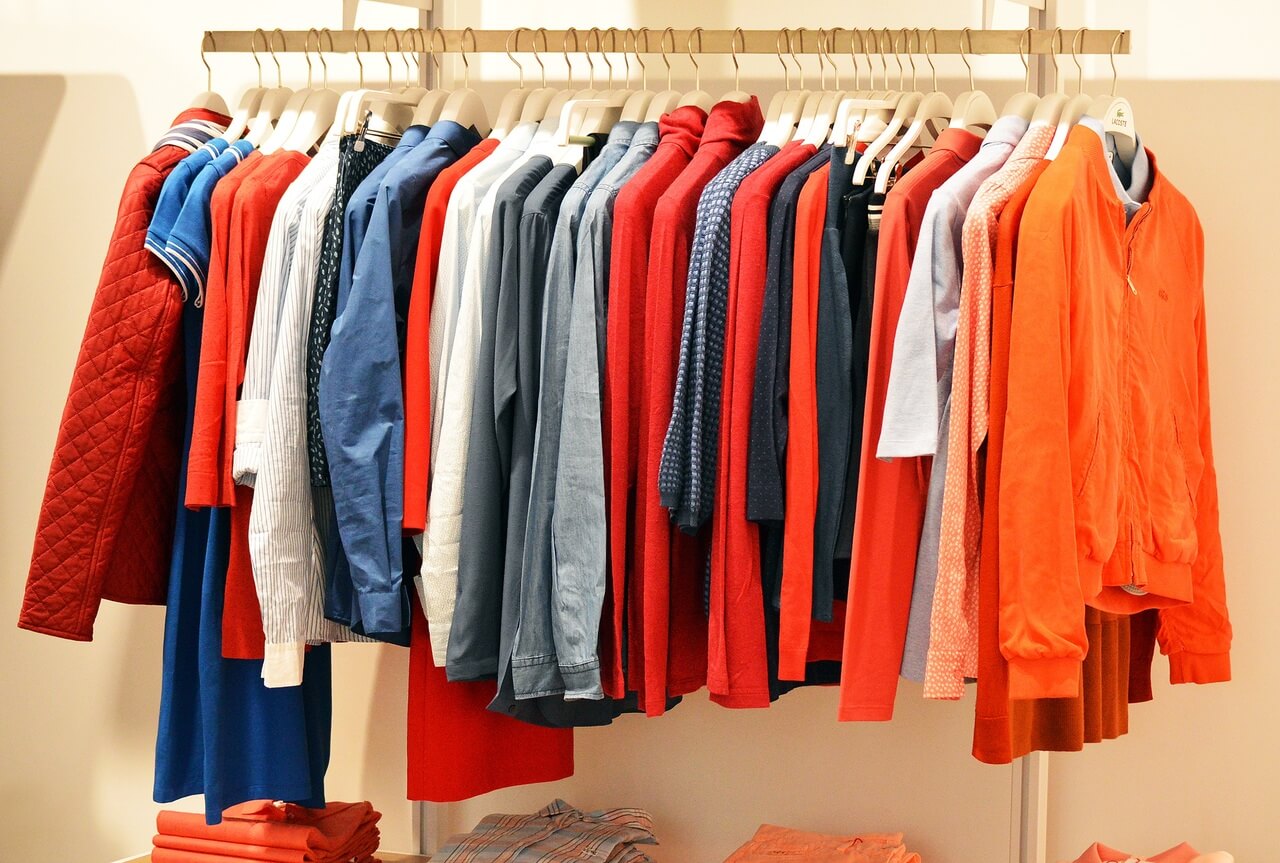
Northern
Cities in Northern Vietnam primarily have a humid subtropical climate. Therefore, the main weather of the year is summer and winter. In your clothing set, you should focus on long clothes, keep warm well, and not too short.
Central
The Central and South Central regions have a tropical monsoon climate, with distinct divisions between the sunny and rainy seasons. At the same time, the climate here often changes erratically throughout the year. Clothes for the sunny and winter seasons are both necessary, depending on the time you visit these cities.
South
The South is characterized by being near the equator, with hot and very hot times. Therefore, you should choose clothes that are good at protecting against the sun, cool and not too thick. In a few months, the weather will also rain, but it rains mostly in the afternoon and evening.
Traditional costumes at festivals in Vietnam
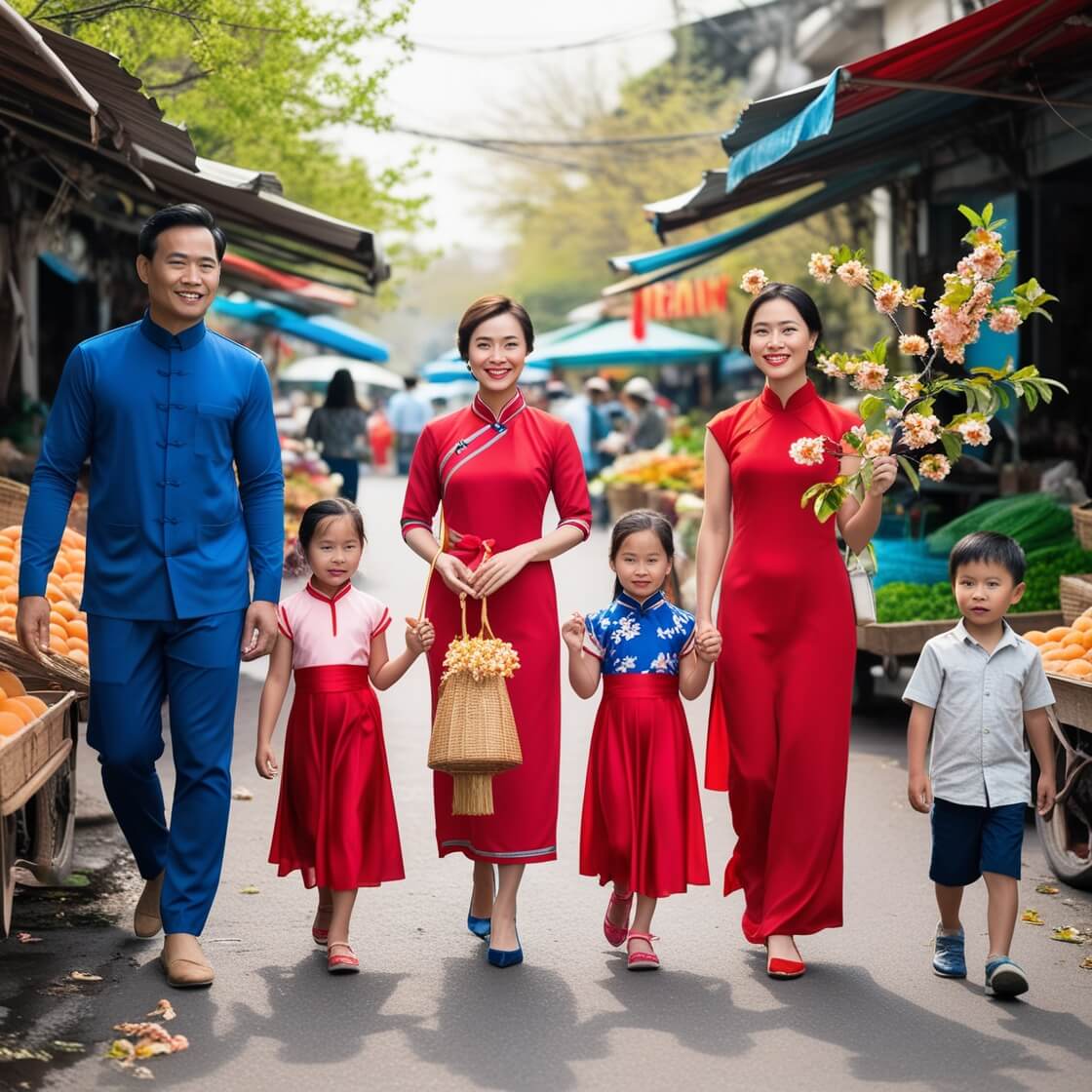
Lunar New Year (Tet Nguyen Dan)
At the moment of welcoming the New Year at the beginning of the new year, all Vietnamese people often wear red clothes. Because in their opinion, red symbolizes luck, good signs, prosperity, wealth, and prosperity. Along with that, new clothes, the most beautiful clothes according to each person’s preferences and style will be shown at this time.
Wedding in Vietnam
To show respect for the bride and groom, guests often wear elegant, sophisticated, and formal attire such as:
- Boys: suits, trousers combined with shirts, collared shirts, blue/black pants
- Girls: dresses, skirts that are not too short and sensitive
In some cases, the bride and groom will ask guests to wear the color tones they want so that their wedding party will go better.
Explore More: What should Expat wear as a guest at a wedding in Vietnam?
Visiting/worshipping at temples
Most temples and pagodas in Vietnam have a rule that you are not allowed to wear sexy and seductive clothes when visiting or worshiping.
You need to wear long pants, T-shirts or turtlenecks that cover your whole body, especially not wearing sleeveless clothes. If you do not follow the rules, they can prohibit you or ask you to leave if necessary.
Special costumes of famous tourist destinations
Hue City
Hue is known as the famous Ao Dai in Vietnam, the cradle of the five-panel Ao Dai, and at the same time the land that has preserved, nurtured, and developed the Vietnamese Ao Dai for hundreds of years. When discussing Vietnam, it’s impossible to overlook the Ao Dai worn by Hue women, which has enhanced the beauty of traditional Vietnamese attire.
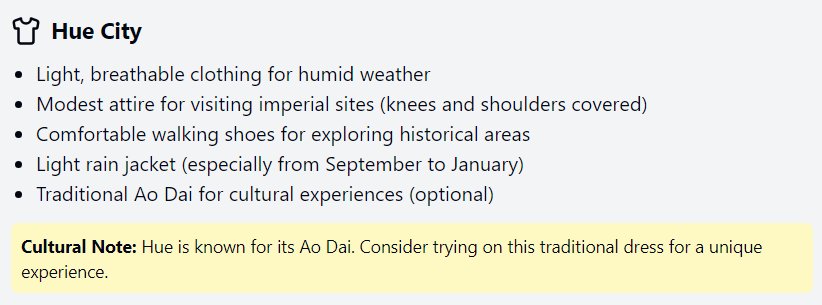
Northwest Region
Not only does the beautiful scenery and winding mountain roads captivate visitors, but the colorful traditional costumes of ethnic groups in the Northwest region are also a major attraction for tourists.
- Brilliant with the traditional costumes of the H’Mong people: including 4 main colors: blue – red – purple – yellow. The complete costume includes a skirt, shirt, bib, leggings, and belt in which the skirt is conical, pleated, and flared with meticulous and delicate embroidered motifs. They also wear belts, leggings, and a square scarf embroidered with flowers.
- Traditional costumes of the Tay people: made from self-woven cotton fabrics, dyed indigo. Men’s costumes usually include wide-leg pants, a waistband, and a short, five-panel shirt with a standing collar. Meanwhile, women’s costumes include a long, five-panel blouse, skirt pants, belt, head scarf and fabric shoes.
- Unique with the traditional costumes of the Thai people: The graceful beauty with delicate patterns is shown through the traditional costume with a com shirt, black skirt, green belt, silver chain, and especially the Pieu scarf.
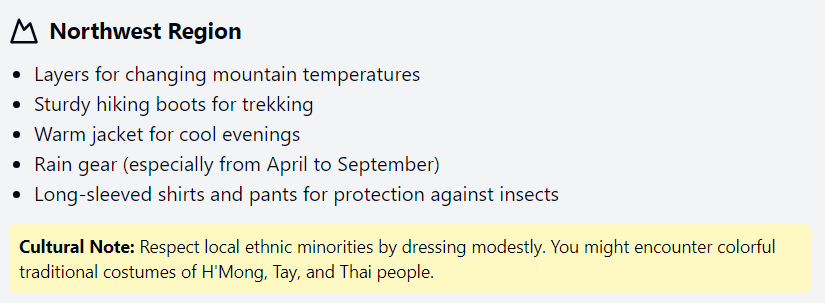
Central Highlands Region
Typically, the traditional costumes of Central Highlands ethnic groups consist of loincloths, pullovers, or wrap-around robes for men, and shirts and skirts for women… They use two main colors: red, and black (ethnic groups of the Northern Central Highlands) and dark blue, and white (ethnic groups of the Southern Central Highlands). Along with that, they combine woven fabrics, and embroidering patterns with images close to nature.
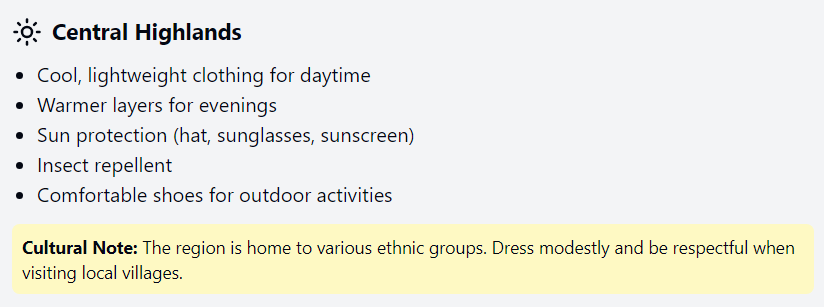
Cham people on the central/southern coast
Cham people prefer colorful costumes, men can just wear plain white but women have to “dress up” in floral skirts with clothes of all colors from blue, red, purple, and yellow to dark colors.
- Cham women’s ao dai includes ao dai, skirt, diagonal belt (talei Kabak), horizontal belt (talei ka-in), full head scarf, and cannot forget jewelry, and shiny beads.
- Cham men’s costumes are much simpler than women’s, they usually wear casual clothes quite similar to the Kinh ethnic Vietnamese. But on traditional occasions, they pay great attention to choosing ethnic clothes: ao dai, wrapped in a sarong and wearing a hat.
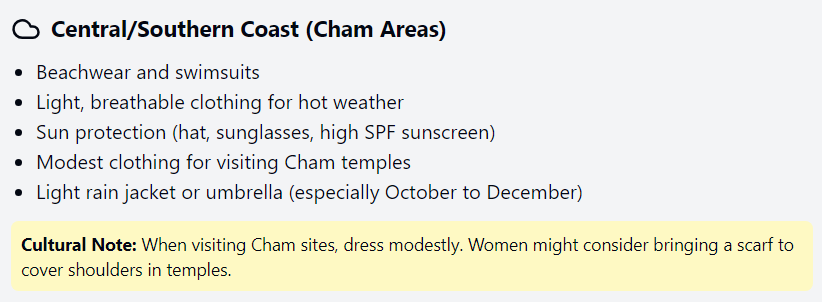
The above article clearly states the characteristics of choosing seasonal clothes in Vietnam. At the same time, you also have more knowledge to choose suitable clothes to look more “stylish” and know the traditional costumes of each region when visiting scenic spots in Vietnam.






